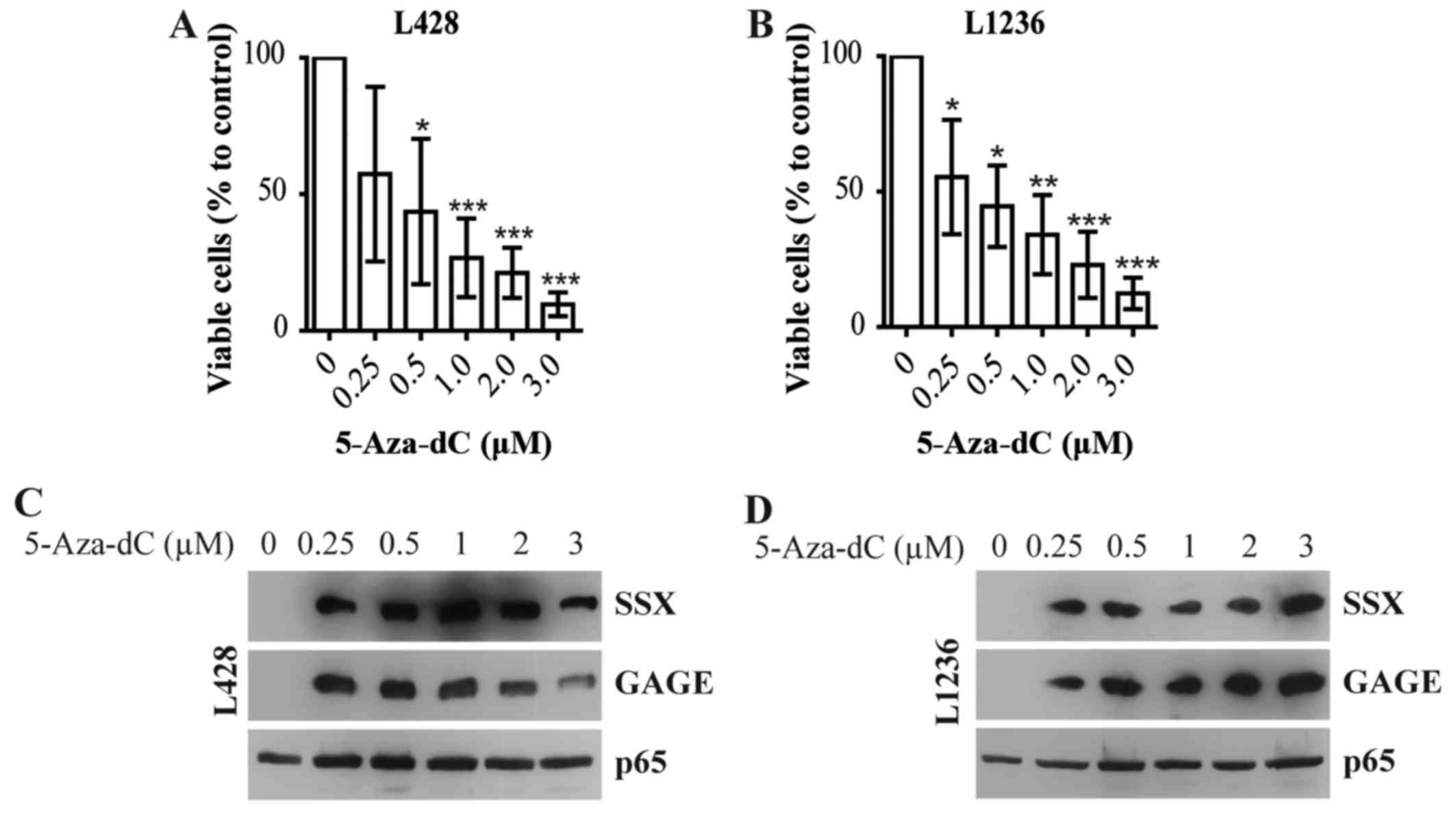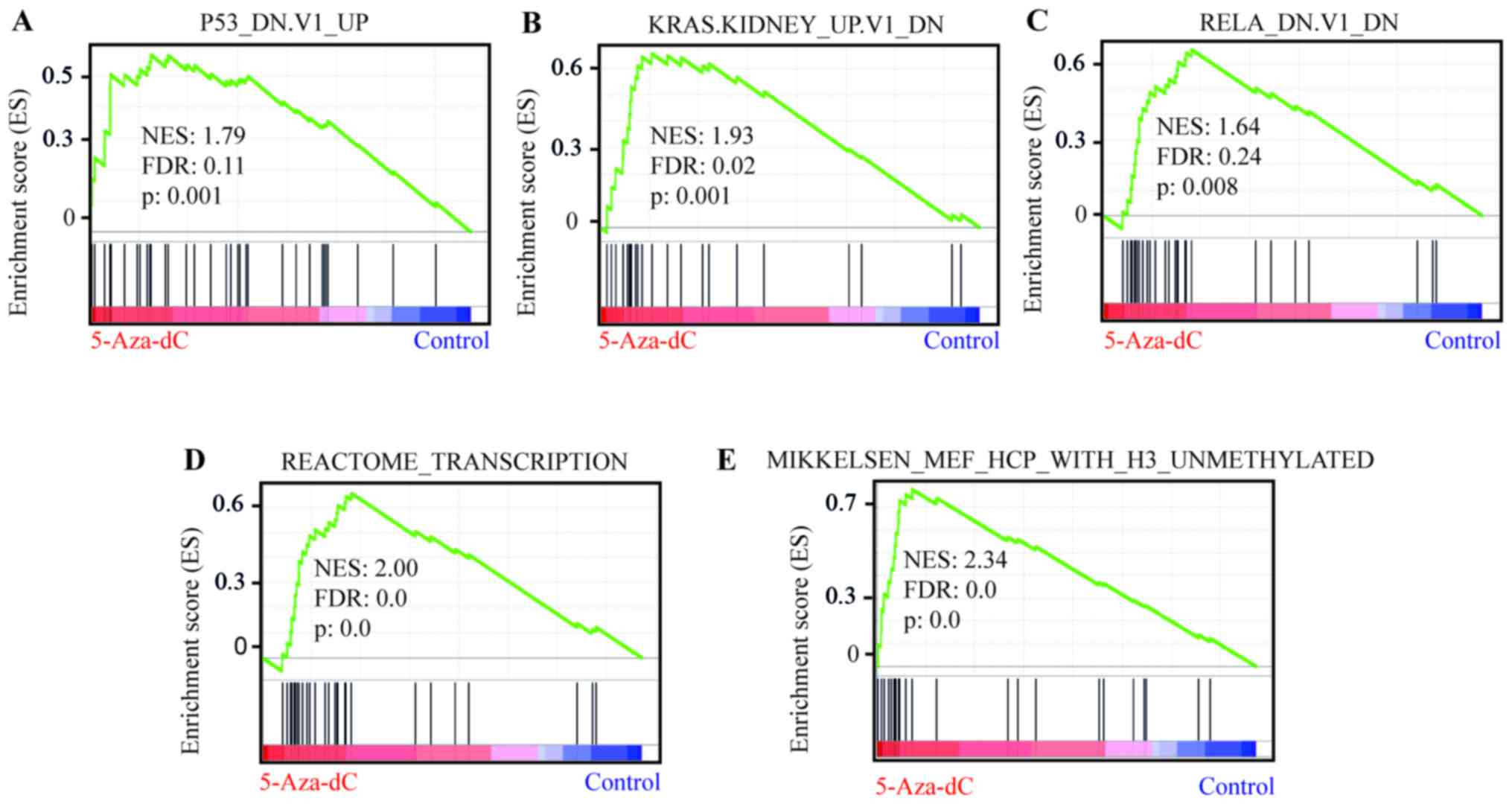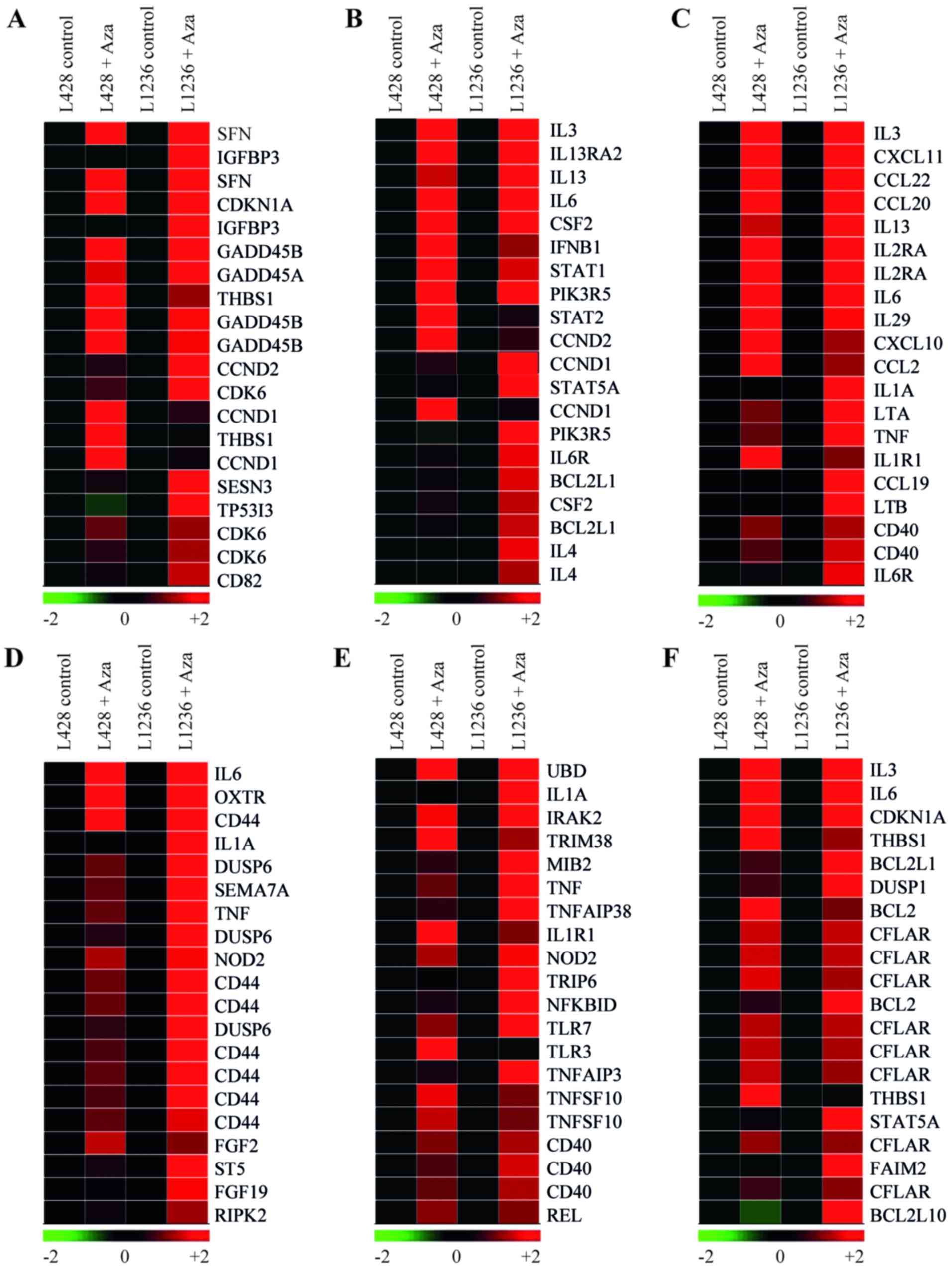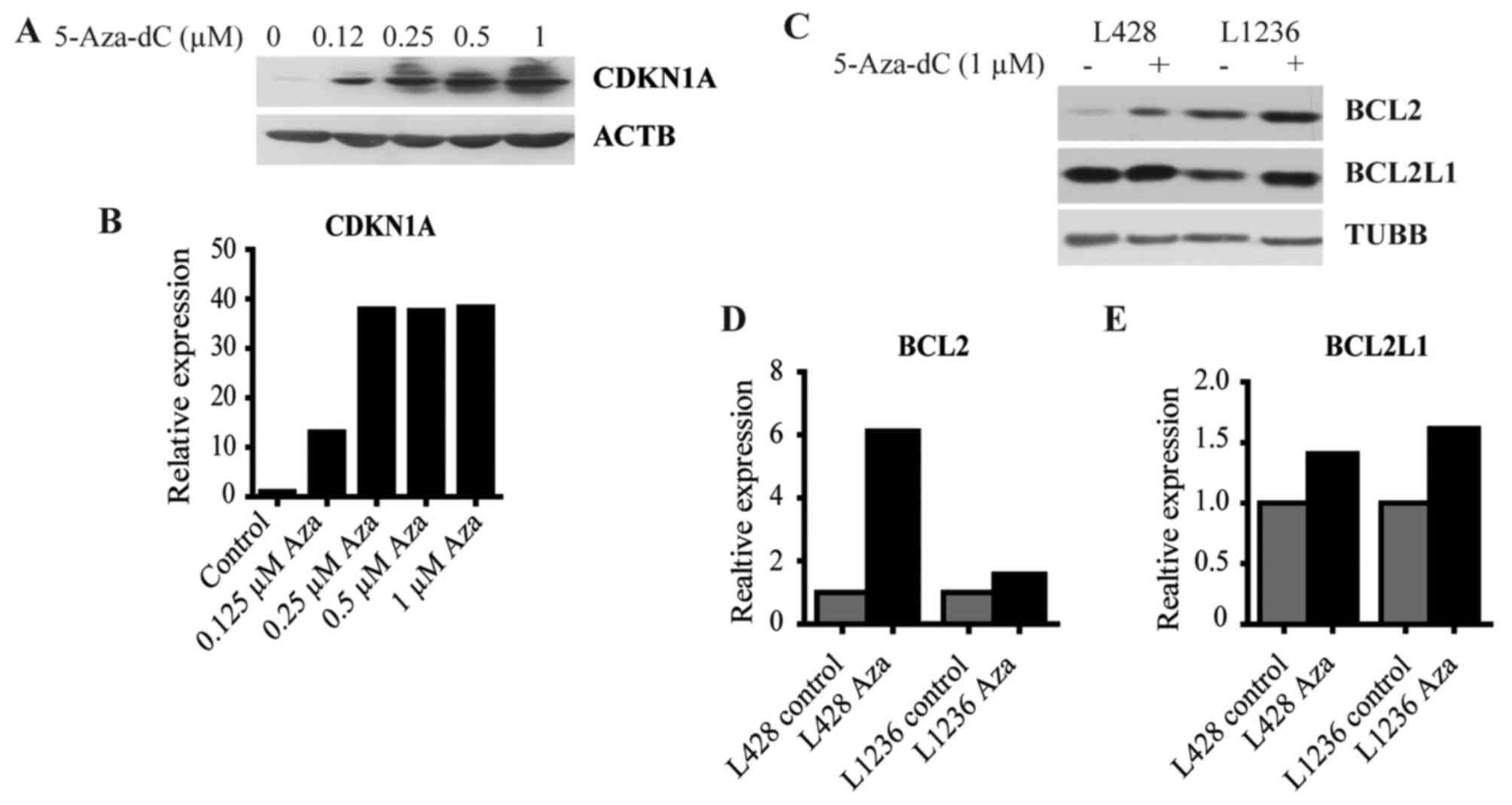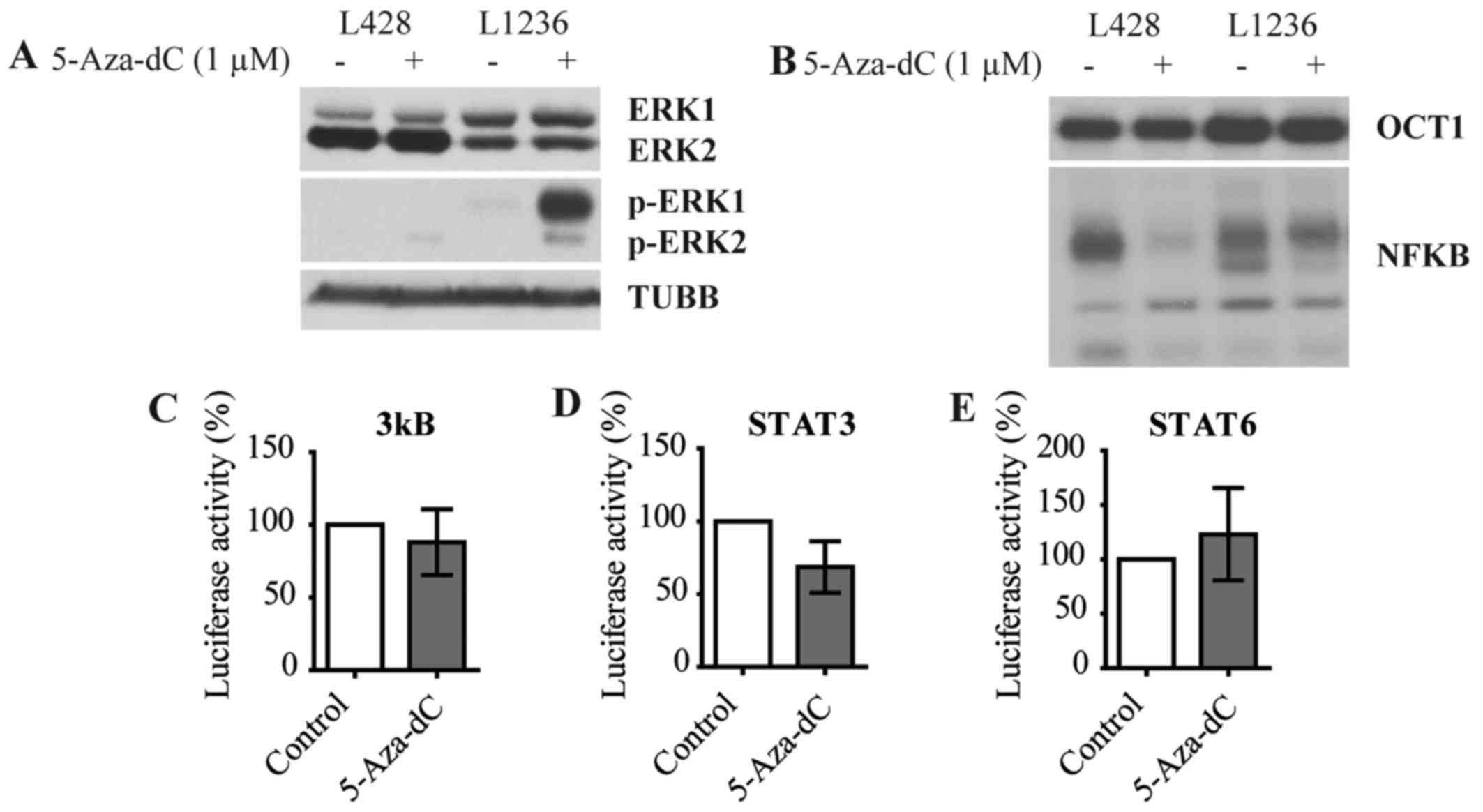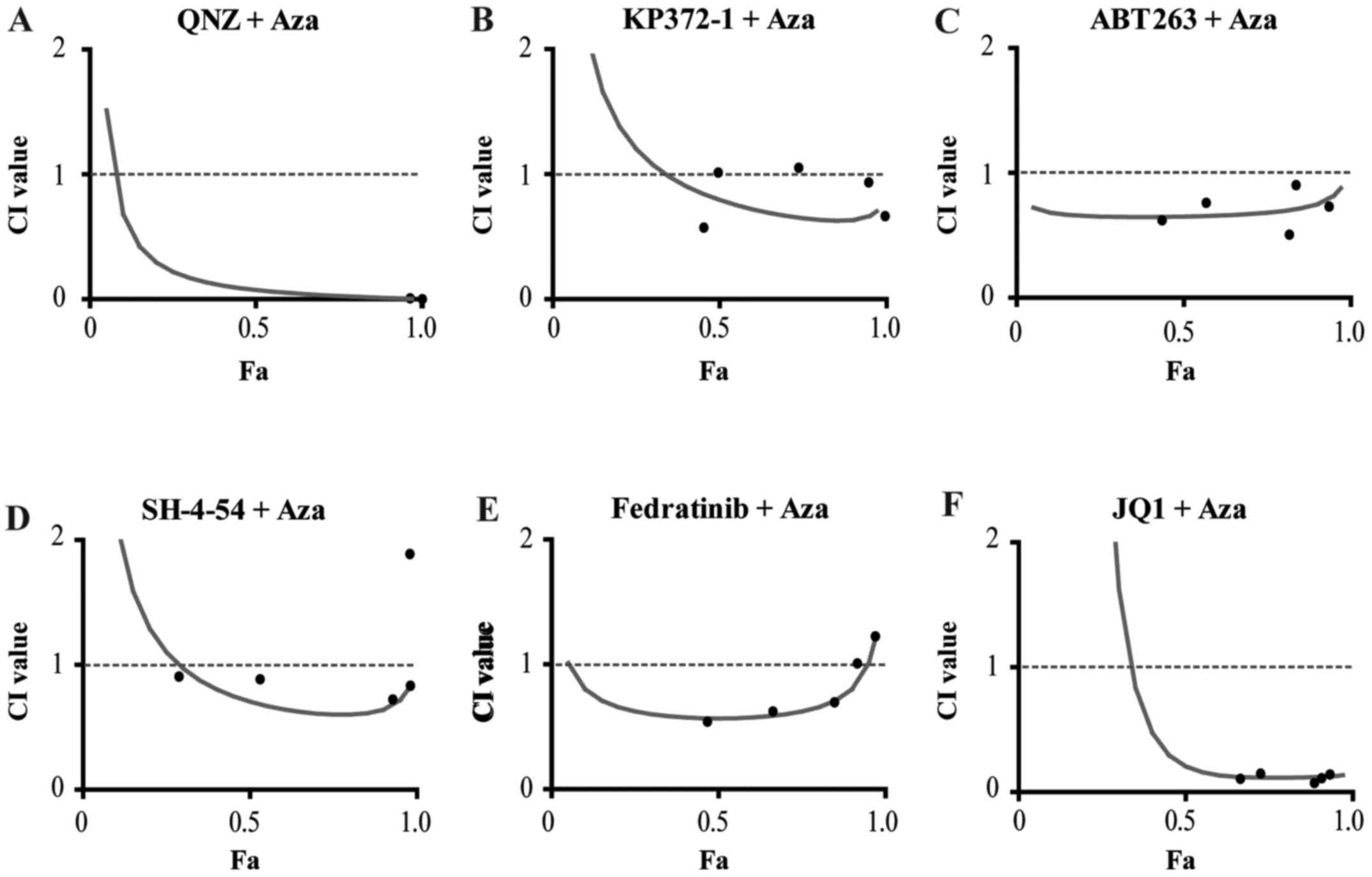|
1
|
Küppers R: The biology of Hodgkin's
lymphoma. Nat Rev Cancer. 9:15–27. 2009. View Article : Google Scholar
|
|
2
|
Gobbi PG, Ferreri AJ, Ponzoni M and Levis
A: Hodgkin lymphoma. Crit Rev Oncol Hematol. 85:216–237. 2013.
View Article : Google Scholar
|
|
3
|
Küppers R and Hansmann ML: The Hodgkin and
Reed/Sternberg cell. Int J Biochem Cell Biol. 37:511–517. 2005.
View Article : Google Scholar
|
|
4
|
Doerr JR, Malone CS, Fike FM, Gordon MS,
Soghomonian SV, Thomas RK, Tao Q, Murray PG, Diehl V, Teitell MA,
et al: Patterned CpG methylation of silenced B cell gene promoters
in classical Hodgkin lymphoma-derived and primary effusion lymphoma
cell lines. J Mol Biol. 350:631–640. 2005. View Article : Google Scholar : PubMed/NCBI
|
|
5
|
Ehlers A, Oker E, Bentink S, Lenze D,
Stein H and Hummel M: Histone acetylation and DNA demethylation of
B cells result in a Hodgkin-like phenotype. Leukemia. 22:835–841.
2008. View Article : Google Scholar : PubMed/NCBI
|
|
6
|
Ushmorov A, Leithäuser F, Sakk O,
Weinhaüsel A, Popov SW, Möller P and Wirth T: Epigenetic processes
play a major role in B-cell-specific gene silencing in classical
Hodgkin lymphoma. Blood. 107:2493–2500. 2006. View Article : Google Scholar
|
|
7
|
Yuki H, Ueno S, Tatetsu H, Niiro H, Iino
T, Endo S, Kawano Y, Komohara Y, Takeya M, Hata H, et al: PU.1 is a
potent tumor suppressor in classical Hodgkin lymphoma cells. Blood.
121:962–970. 2013. View Article : Google Scholar
|
|
8
|
García JF, Villuendas R, Algara P, Sáez
AI, Sánchez-Verde L, Martínez-Montero JC, Martínez P and Piris MA:
Loss of p16 protein expression associated with methylation of the
p16INK4A gene is a frequent finding in Hodgkin's disease. Lab
Invest. 79:1453–1459. 1999.
|
|
9
|
Sánchez-Aguilera A, Delgado J, Camacho FI,
Sánchez-Beato M, Sánchez L, Montalbán C, Fresno MF, Martín C, Piris
MA and García JF: Silencing of the p18INK4c gene by promoter
hypermethylation in Reed-Sternberg cells in Hodgkin lymphomas.
Blood. 103:2351–2357. 2004. View Article : Google Scholar
|
|
10
|
Guan H, Xie L, Leithäuser F, Flossbach L,
Möller P, Wirth T and Ushmorov A: KLF4 is a tumor suppressor in
B-cell non-Hodgkin lymphoma and in classic Hodgkin lymphoma. Blood.
116:1469–1478. 2010. View Article : Google Scholar : PubMed/NCBI
|
|
11
|
Pathania R, Ramachandran S, Elangovan S,
Padia R, Yang P, Cinghu S, Veeranan-Karmegam R, Arjunan P,
Gnana-Prakasam JP, Sadanand F, et al: DNMT1 is essential for
mammary and cancer stem cell maintenance and tumorigenesis. Nat
Commun. 6:69102015. View Article : Google Scholar : PubMed/NCBI
|
|
12
|
Völkel P, Dupret B and Le Bourhisxand
Angrand PO: Diverse involvement of EZH2 in cancer epigenetics. Am J
Transl Res. 7:175–193. 2015.PubMed/NCBI
|
|
13
|
VanderMolen KM, McCulloch W, Pearce CJ and
Oberlies NH: Romidepsin (Istodax, NSC 630176, FR901228, FK228,
depsipeptide): A natural product recently approved for cutaneous
T-cell lymphoma. J Antibiot (Tokyo). 64:525–531. 2011. View Article : Google Scholar
|
|
14
|
Subbiah V, Brown RE, McGuire MF, Buryanek
J, Janku F, Younes A and Hong D: A novel immunomodulatory
molecularly targeted strategy for refractory Hodgkin's lymphoma.
Oncotarget. 5:95–102. 2014.PubMed/NCBI
|
|
15
|
Oki Y, Copeland A and Younes A: Clinical
development of panobinostat in classical Hodgkin's lymphoma. Expert
Rev Hematol. 4:245–252. 2011. View Article : Google Scholar : PubMed/NCBI
|
|
16
|
Jóna A, Khaskhely N, Buglio D, Shafer JA,
Derenzini E, Bollard CM, Medeiros LJ, Illés A, Ji Y and Younes A:
The histone deacetylase inhibitor entinostat (SNDX-275) induces
apoptosis in Hodgkin lymphoma cells and synergizes with Bcl-2
family inhibitors. Exp Hematol. 39:1007–1017.e1. 2011. View Article : Google Scholar :
|
|
17
|
Kim TK, Gore SD and Zeidan AM: Epigenetic
therapy in acute myeloid keukemia: Current and future directions.
Semin Hematol. 52:172–183. 2015. View Article : Google Scholar : PubMed/NCBI
|
|
18
|
Saba HI: Decitabine in the treatment of
myelodysplastic syndromes. Ther Clin Risk Manag. 3:807–817.
2007.
|
|
19
|
D'Alò F, Leone G, Hohaus S, Teofili L,
Bozzoli V, Tisi MC, Rufini V, Calcagni ML and Voso MT: Response to
5-azacytidine in a patient with relapsed Hodgkin lymphoma and a
therapy-related myelodysplastic syndrome. Br J Haematol.
154:141–143. 2011. View Article : Google Scholar : PubMed/NCBI
|
|
20
|
Derissen EJ, Beijnen JH and Schellens JH:
Concise drug review: Azacitidine and decitabine. Oncologist.
18:619–624. 2013. View Article : Google Scholar : PubMed/NCBI
|
|
21
|
Ushmorov A, Ritz O, Hummel M, Leithäuser
F, Möller P, Stein H and Wirth T: Epigenetic silencing of the
immunoglobulin heavy-chain gene in classical Hodgkin
lymphoma-derived cell lines contributes to the loss of
immunoglobulin expression. Blood. 104:3326–3334. 2004. View Article : Google Scholar : PubMed/NCBI
|
|
22
|
Mootha VK, Lindgren CM, Eriksson KF,
Subramanian A, Sihag S, Lehar J, Puigserver P, Carlsson E,
Ridderstråle M, Laurila E, et al: PGC-1alpha-responsive genes
involved in oxidative phosphorylation are coordinately
downregulated in human diabetes. Nat Genet. 34:267–273. 2003.
View Article : Google Scholar : PubMed/NCBI
|
|
23
|
Subramanian A, Tamayo P, Mootha VK,
Mukherjee S, Ebert BL, Gillette MA, Paulovich A, Pomeroy SL, Golub
TR, Lander ES, et al: Gene set enrichment analysis: A
knowledge-based approach for interpreting genome-wide expression
profiles. Proc Natl Acad Sci USA. 102:15545–15550. 2005. View Article : Google Scholar : PubMed/NCBI
|
|
24
|
Chou TC: Theoretical basis, experimental
design, and computerized simulation of synergism and antagonism in
drug combination studies. Pharmacol Rev. 58:621–681. 2006.
View Article : Google Scholar : PubMed/NCBI
|
|
25
|
Chou TC and Talalay P: Quantitative
analysis of dose-effect relationships: The combined effects of
multiple drugs or enzyme inhibitors. Adv Enzyme Regul. 22:27–55.
1984. View Article : Google Scholar : PubMed/NCBI
|
|
26
|
Maier HJ, Schips TG, Wietelmann A, Krüger
M, Brunner C, Sauter M, Klingel K, Böttger T, Braun T and Wirth T:
Cardiomyocyte-specific IκB kinase (IKK)/NF-κB activation induces
reversible inflammatory cardiomyopathy and heart failure. Proc Natl
Acad Sci USA. 109:11794–11799. 2012. View Article : Google Scholar
|
|
27
|
Ritz O, Guiter C, Dorsch K, Dusanter-Fourt
I, Wegener S, Jouault H, Gaulard P, Castellano F, Möller P and
Leroy K: STAT6 activity is regulated by SOCS-1 and modulates BCL-XL
expression in primary mediastinal B-cell lymphoma. Leukemia.
22:2106–2110. 2008. View Article : Google Scholar : PubMed/NCBI
|
|
28
|
Guan H, Xie L, Klapproth K, Weitzer CD,
Wirth T and Ushmorov A: Decitabine represses translocated MYC
oncogene in Burkitt lymphoma. J Pathol. 229:775–783. 2013.
View Article : Google Scholar : PubMed/NCBI
|
|
29
|
Bender CM, Gonzalgo ML, Gonzales FA,
Nguyen CT, Robertson KD and Jones PA: Roles of cell division and
gene transcription in the methylation of CpG islands. Mol Cell
Biol. 19:6690–6698. 1999. View Article : Google Scholar : PubMed/NCBI
|
|
30
|
Atallah E, Kantarjian H and Garcia-Manero
G: The role of decitabine in the treatment of myelodysplastic
syndromes. Expert Opin Pharmacother. 8:65–73. 2007. View Article : Google Scholar
|
|
31
|
Shafer JA, Cruz CR, Leen AM, Ku S, Lu A,
Rousseau A, Heslop HE, Rooney CM, Bollard CM and Foster AE:
Antigen-specific cytotoxic T lymphocytes can target chemoresistant
side-population tumor cells in Hodgkin lymphoma. Leuk Lymphoma.
51:870–880. 2010. View Article : Google Scholar : PubMed/NCBI
|
|
32
|
Hermeking H and Benzinger A: 14-3-3
proteins in cell cycle regulation. Semin Cancer Biol. 16:183–192.
2006. View Article : Google Scholar : PubMed/NCBI
|
|
33
|
Polyak K, Xia Y, Zweier JL, Kinzler KW and
Vogelstein B: A model for p53-induced apoptosis. Nature.
389:300–305. 1997. View
Article : Google Scholar : PubMed/NCBI
|
|
34
|
Baek KH, Bhang D, Zaslavsky A, Wang LC,
Vachani A, Kim CF, Albelda SM, Evan GI and Ryeom S:
Thrombospondin-1 mediates oncogenic Ras-induced senescence in
premalignant lung tumors. J Clin Invest. 123:4375–4389. 2013.
View Article : Google Scholar : PubMed/NCBI
|
|
35
|
Muller S, Filippakopoulos P and Knapp S:
Bromodomains as therapeutic targets. Expert Rev Mol Med.
13:e292011. View Article : Google Scholar : PubMed/NCBI
|
|
36
|
Mazur G, Jaskuła E, Kryczek I, Dłubek D,
Butrym A, Wróbel T, Lange A and Kuliczkowski K: Proinflammatory
chemokine gene expression influences survival of patients with
non-Hodgkin's lymphoma. Folia Histochem Cytobiol. 49:240–247. 2011.
View Article : Google Scholar : PubMed/NCBI
|
|
37
|
Ouaguia L, Mrizak D, Renaud S, Moralès O
and Delhem N: Control of the inflammatory response mechanisms
mediated by natural and induced regulatory T-cells in HCV-,
HTLV-1-, and EBV-associated cancers. Mediators Inflamm.
2014:5642962014. View Article : Google Scholar : PubMed/NCBI
|
|
38
|
Hinz M, Lemke P, Anagnostopoulos I, Hacker
C, Krappmann D, Mathas S, Dörken B, Zenke M, Stein H and
Scheidereit C: Nuclear factor kappaB-dependent gene expression
profiling of Hodgkin's disease tumor cells, pathogenetic
significance, and link to constitutive signal transducer and
activator of transcription 5a activity. J Exp Med. 196:605–617.
2002. View Article : Google Scholar : PubMed/NCBI
|
|
39
|
Abbas T and Dutta A: p21 in cancer:
Intricate networks and multiple activities. Nat Rev Cancer.
9:400–414. 2009. View Article : Google Scholar : PubMed/NCBI
|
|
40
|
Brown R and Plumb JA: Demethylation of DNA
by decitabine in cancer chemotherapy. Expert Rev Anticancer Ther.
4:501–510. 2004. View Article : Google Scholar : PubMed/NCBI
|
|
41
|
Cruz CR, Gerdemann U, Leen AM, Shafer JA,
Ku S, Tzou B, Horton TM, Sheehan A, Copeland A, Younes A, et al:
Improving T-cell therapy for relapsed EBV-negative Hodgkin lymphoma
by targeting upregulated MAGE-A4. Clin Cancer Res. 17:7058–7066.
2011. View Article : Google Scholar : PubMed/NCBI
|
|
42
|
Stewart ML, Tamayo P, Wilson AJ, Wang S,
Chang YM, Kim JW, Khabele D, Shamji AF and Schreiber SL: KRAS
genomic status predicts the sensitivity of ovarian cancer cells to
decitabine. Cancer Res. 75:2897–2906. 2015. View Article : Google Scholar : PubMed/NCBI
|
|
43
|
Nishioka C, Ikezoe T, Yang J, Komatsu N,
Koeffler HP and Yokoyama A: Blockade of MEK signaling potentiates
5-Aza-2′-deoxycytidine-induced apoptosis and upregulation of
p21(waf1) in acute myelogenous leukemia cells. Int J Cancer.
125:1168–1176. 2009. View Article : Google Scholar : PubMed/NCBI
|
|
44
|
Guan H, Mi B, Li Y, Wu W, Tan P, Fang Z,
Li J, Zhang Y and Li F: Decitabine represses osteoclastogenesis
through inhibition of RANK and NF-κB. Cell Signal. 27:969–977.
2015. View Article : Google Scholar : PubMed/NCBI
|
|
45
|
Stevenson WS, Best OG, Przybylla A, Chen
Q, Singh N, Koleth M, Pierce S, Kennedy T, Tong W, Kuang SQ, et al:
DNA methylation of membrane-bound tyrosine phosphatase genes in
acute lymphoblastic leukaemia. Leukemia. 28:787–793. 2014.
View Article : Google Scholar
|
|
46
|
Lin JC, Wu YY, Wu JY, Lin TC, Wu CT, Chang
YL, Jou YS, Hong TM and Yang PC: TROP2 is epigenetically
inactivated and modulates IGF-1R signalling in lung adenocarcinoma.
EMBO Mol Med. 4:472–485. 2012. View Article : Google Scholar : PubMed/NCBI
|
|
47
|
Han Y, Amin HM, Frantz C, Franko B, Lee J,
Lin Q and Lai R: Restoration of shp1 expression by
5-AZA-2′-deoxycytidine is associated with downregulation of
JAK3/STAT3 signaling in ALK-positive anaplastic large cell
lymphoma. Leukemia. 20:1602–1609. 2006. View Article : Google Scholar : PubMed/NCBI
|
|
48
|
Galm O, Yoshikawa H, Esteller M, Osieka R
and Herman JG: SOCS-1, a negative regulator of cytokine signaling,
is frequently silenced by methylation in multiple myeloma. Blood.
101:2784–2788. 2003. View Article : Google Scholar
|
|
49
|
Laurenzana A, Petruccelli LA, Pettersson
F, Figueroa ME, Melnick A, Baldwin AS, Paoletti F and Miller WH Jr:
Inhibition of DNA methyltransferase activates tumor necrosis factor
alpha-induced monocytic differentiation in acute myeloid leukemia
cells. Cancer Res. 69:55–64. 2009. View Article : Google Scholar : PubMed/NCBI
|
|
50
|
Takebayashi S, Nakao M, Fujita N, Sado T,
Tanaka M, Taguchi H and Okumura K: 5-Aza-2′-deoxycytidine induces
histone hyperacetylation of mouse centromeric heterochromatin by a
mechanism independent of DNA demethylation. Biochem Biophys Res
Commun. 288:921–926. 2001. View Article : Google Scholar : PubMed/NCBI
|
|
51
|
Plumb JA, Strathdee G, Sludden J, Kaye SB
and Brown R: Reversal of drug resistance in human tumor xenografts
by 2′-deoxy-5-azacytidine-induced demethylation of the hMLH1 gene
promoter. Cancer Res. 60:6039–6044. 2000.PubMed/NCBI
|
|
52
|
Lou YF, Zou ZZ, Chen PJ, Huang GB, Li B,
Zheng DQ, Yu XR and Luo XY: Combination of gefitinib and DNA
methylation inhibitor decitabine exerts synergistic anti-cancer
activity in colon cancer cells. PLoS One. 9:e977192014. View Article : Google Scholar : PubMed/NCBI
|
|
53
|
Hao Y, Chapuy B, Monti S, Sun HH, Rodig SJ
and Shipp MA: Selective JAK2 inhibition specifically decreases
Hodgkin lymphoma and mediastinal large B-cell lymphoma growth in
vitro and in vivo. Clin Cancer Res. 20:2674–2683. 2014. View Article : Google Scholar : PubMed/NCBI
|
|
54
|
Jost PJ and Ruland J: Aberrant NF-kappaB
signaling in lymphoma: Mechanisms, consequences, and therapeutic
implications. Blood. 109:2700–2707. 2007.
|
|
55
|
Blum KA, Johnson JL, Niedzwiecki D,
Canellos GP, Cheson BD and Bartlett NL: Single agent bortezomib in
the treatment of relapsed and refractory Hodgkin lymphoma: Cancer
and leukemia Group B protocol 50206. Leuk Lymphoma. 48:1313–1319.
2007. View Article : Google Scholar : PubMed/NCBI
|
|
56
|
Boucher MJ, Morisset J, Vachon PH, Reed
JC, Lainé J and Rivard N: MEK/ERK signaling pathway regulates the
expression of Bcl-2, Bcl-X(L), and Mcl-1 and promotes survival of
human pancreatic cancer cells. J Cell Biochem. 79:355–369. 2000.
View Article : Google Scholar : PubMed/NCBI
|
|
57
|
Chapuy B, McKeown MR, Lin CY, Monti S,
Roemer MG, Qi J, Rahl PB, Sun HH, Yeda KT, Doench JG, et al:
Discovery and characterization of super-enhancer-associated
dependencies in diffuse large B cell lymphoma. Cancer Cell.
24:777–790. 2013. View Article : Google Scholar : PubMed/NCBI
|
|
58
|
Godley LA and Le Beau MM: The histone code
and treatments for acute myeloid leukemia. N Engl J Med.
366:960–961. 2012. View Article : Google Scholar : PubMed/NCBI
|
|
59
|
Malik P and Cashen AF: Decitabine in the
treatment of acute myeloid leukemia in elderly patients. Cancer
Manag Res. 6:53–61. 2014.PubMed/NCBI
|















